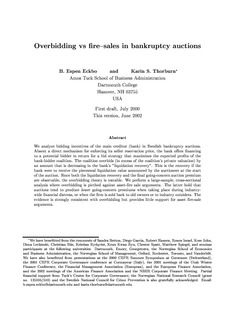Overbidding vs fire-sales in bankruptcy auctions
Working paper
Permanent lenke
http://hdl.handle.net/11250/163717Utgivelsesdato
2002-06Metadata
Vis full innførselSamlinger
- Discussion papers (FOR) [566]
Sammendrag
We analyze bidding incentives of the main creditor (bank) in Swedish bankruptcy auctions. Absent a direct mechanism for enforcing its seller reservation price, the bank offers financing to a potential bidder in return for a bid strategy that maximizes the expected profits of the bank-bidder coalition. The coalition overbids (in excess of the coalition's private valuation) by an amount that is decreasing in the bank's "liquidation recovery". This is the recovery if the bank were to receive the piecemeal liquidation value announced by the auctioneer at the start of the auction. Since both the liquidation recovery and the final going-concern auction premium are observable, the overbidding theory is testable. We perform a large-sample, cross-sectional analysis where overbidding is picthed against asset-fire sale arguments. The latter hold that auctions tend to produce lower going-concern premiums when taking place during industry-wide financial distress, or when the firm is sold back to old owners or to industry outsiders. The evidence is strongly consistent with overbidding but provides little support for asset fire-sale arguments.
Beskrivelse
First draft, July 2000
Revised 28.11.02
Utgiver
Norwegian School of Economics and Business Administration. Department of Finance and Management ScienceSerie
Discussion paper2002:3
